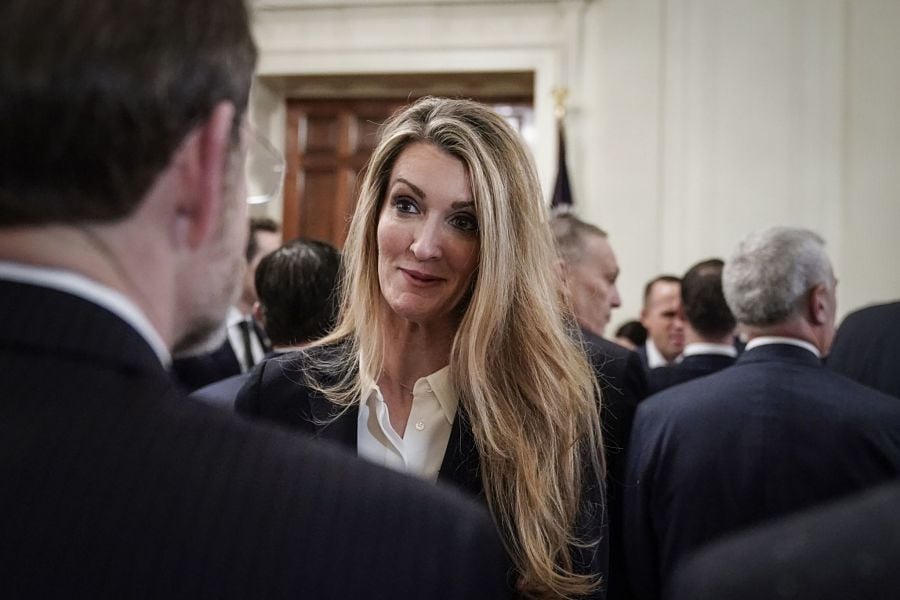

Lawmakers who are under suspicion of insider trading over stock sales they made following briefings about the potential catastrophic impact of COVID-19 can’t rely on the fact that they use a financial adviser to escape scrutiny, experts say.
Sen. Kelly Loeffler, R-Ga., is one of the members of Congress who has drawn attention because she sold and purchased hundreds of thousands of dollars of stock following her participation in a Jan. 24 committee meeting with administration officials. Her market moves, outlined in a Senate disclosure, were first reported by The Daily Beast.
In an interview on Fox News Monday, Loeffler said that she and her husband, Jeffrey Sprecher, chairman of the New York Stock Exchange, have no discretionary authority over their accounts.
“I’m not involved in the decisions around buying and selling,” Loeffler said in a transcript posted by her staff. “There’s a range of different decisions made every day with regard to my savings and 401K portfolios that I’m not involved in. No longer do my husband and I have the ability to do discretionary trades, and that’s why it’s outsourced to third-party investment managers.”
But using a financial adviser doesn’t go far enough to escape insider trading suspicion, said Thomas Gorman, a partner at Dorsey & Whitney. A “foolproof” defense would involve putting assets into a blind trust or using an automated trading program.
“There’s no real assurance that she had no input” to her financial advisers, said Gorman, a former senior counsel in the Securities and Exchange Commission's Division of Enforcement. “This suggests that she maintained a modicum of control. If you did, that doesn’t give you safe harbor. Not taking the safe approach raises real questions.”
Other lawmakers have also generated controversy with investment sales that occurred after they talked to administration officials about the coronavirus outbreak that has devastated financial markets. The Center for Responsive Politics first reported on market activity by Sen. Richard Burr, R-N.C., that has drawn criticism for potential misuse of insider information.
Burr and the other legislators have denied wrongdoing. But Craig Holman, a government affairs lobbyist at Public Citizen, a watchdog group, said that if they made investment decisions based on “nonpublic information,” they violated a 2012 law known as the Stock Act, which prohibits insider trading by members of Congress.
Holman said lawmakers should cede control of their finances while in office.
“Members of Congress could easily sidestep these questions of potential insider trading if they placed their funds in a qualified blind trust,” he said.
Holman, who was a leading advocate of the Stock Act, thought the measure would curb legislators’ participation in portfolio decisions. But he said one-third of the Senate continues to buy and sell securities.
“Much to my surprise, there are a number of senators who seem unconcerned about the appearance of insider trading,” Holman said.
The SEC likely will look into the insider trading allegations on Capitol Hill, Gorman said.
“This will get on the SEC’s radar,” he said. “You’re supposed to be doing the public’s business, not making yourself money.”

RBC Wealth Management's latest move in New York adds an elite eight-member team to its recently opened Westchester office.

Stifel – so far - is on the hook for more than $166 million in damages, legal fees and settlements in investor complaints involving Roberts, a 35-year industry veteran.

The giant alt investments platform's latest financing led by T. Rowe Price and SurgoCap Partners, along with State Street, UBS, and BNY, will fuel additional growth on multiple fronts.

Some investors recently have seen million dollar plus decisions by FINRA arbitration panels involving complex products decisions go their way.

New report shines a light on how Americans view wealth today.
Orion's Tom Wilson on delivering coordinated, high-touch service in a world where returns alone no longer set you apart.
Barely a decade old, registered index-linked annuities have quickly surged in popularity, thanks to their unique blend of protection and growth potential—an appealing option for investors looking to chart a steadier course through today's choppy market waters, says Myles Lambert, Brighthouse Financial.
